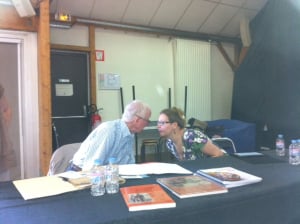As author of Louis Braille: A Touch of Genius, I spent the last week of June in Paris, where I participated in an international colloquium, “The History of Blindness and the Blind.” My assignment was to discuss Louis Braille as a worldwide benefactor, and incidentally to show that Helen Keller was correct in claiming, “we the blind are as indebted to Louis Braille as mankind is to Gutenberg.”
 Mike Mellor discusses last minute details of his talk with the translator, Dr. Hannah Thompson, Royal Holloway, University of London, England.
Mike Mellor discusses last minute details of his talk with the translator, Dr. Hannah Thompson, Royal Holloway, University of London, England.
Evidence of Braille’s broad reach was amply provided during the 2009 celebrations of the bicentennial of his birth. Many countries issued postage stamps featuring Braille (and sometimes braille dots), and the United States minted a silver dollar coin in his honor—an honor rarely granted to non-U.S. citizens. His worldwide achievement is suggested by the fact that my biography has been translated into seven languages: Afrikaans, Chinese, French, German, Japanese, Korean and Polish.
Louis Braille could not possibly have known that the ingenious code he had developed by the age of 15 would be adapted to non-alphabetic languages, and he would surely have been aghast at the thought that braille messages could be sent thousands of miles through the air. Yet, there are clues that he had some sense of how great his achievement was. For example, in the 1840’s his reputation as a teacher was such that he was invited to become the tutor of a blind prince in the Austrian royal family. With an uncharacteristic lack of modesty, he declined, stating that he was the tutor of ALL blind people not just one blind individual.
Just a few years later, terminally ill in the infirmary of the National Institute for Young Blind in Paris, Louis again showed he was aware of his extraordinary achievement. Perhaps in some kind of delirium, he told those in the room that he had experienced the majesty of religion and felt that his mission on earth had been accomplished. Indeed it had. Though he died January 6th 1852 his benefaction continues.
A completely unexpected bonus of attending this conference was the experience of accommodation in a convent. Some of us guests were housed in the spotless, spartan rooms of the Sisters of the Assumption. No TV, no radio, but with wi-fi connection to the web. For me, a long-time New Yorker, it was a delight to wallow in the simplicity, grace and tranquility of the convent, to escape from the ever-present cacophony of the modern world. The sisters had made a vow of silence between 07:00 and 08:00, and guests were asked to honor this practice. The only sound at our simple breakfast of bread, butter, jam, yoghurt and tea or coffee, was of teeth crunching the scrumptious French bread.
